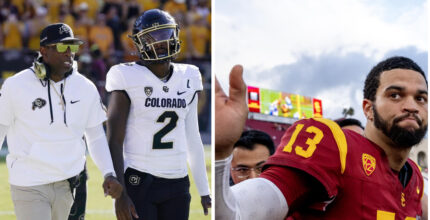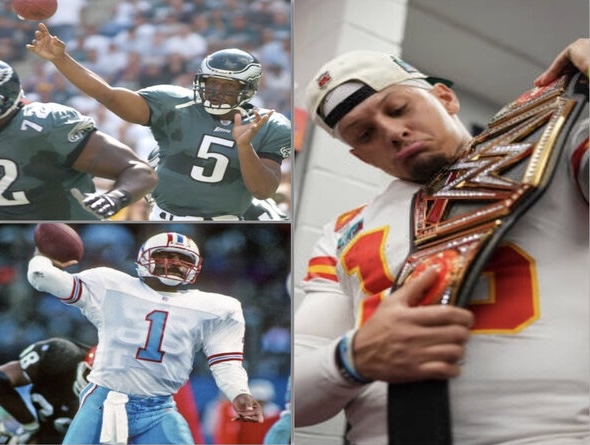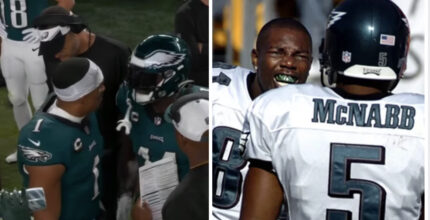Despite black athletes breaking barriers, racism finds new ways to rear its ugly head.
It’s that time of the year where hot takes about the black quarterback fly.
The NFL draft and the assessment of the black quarterback is a tradition in sports where pundits try to speculate about race while trying to make it seem they are not talking about race.
Can he lead? Does he prepare? Will his athletic style work in the pros? Can he stand in the pocket? What about his Wonderlic?
This is especially the case for potential first rounders, because drafting a black quarterback in the first round is a public signal that the team is ready for a black man to be the face of the franchise, and in many cases, the face of the city.
An NFL team can’t miss on a quarterback, but they really CAN’T miss on a black quarterback.
Fueled by old racist stereotypes about the black quarterback, for most of the history of professional football, teams shied away from drafting a black quarterback with their first pick, but twenty years ago, the 1999 draft supposedly changed the game.
Three black men, Donovan McNabb, Akili Smith, and Daunte Culpepper were drafted in the top 11. For many, this signaled a change in attitude in the NFL about black leadership and brought hope that old tropes about the lack of black intelligence and leadership would die out.
Without a doubt, the 1999 draft was historic. Nine of the first top ten players drafted were black, including all-time greats Champ Bailey, Edgerrin James, Torry Holt, and Ricky Williams. But while that crop of talent stole the headlines, it was the selection of the black quarterbacks that brought change.
It was the first time in history that more than one black quarterback was drafted in the first round. Prior to that night, in fact, only four (Eldridge Dickey, Doug Williams, Andre Ware, and Steve McNair) had ever been drafted in the first round, and none higher than McNair, who was taken with the third overall pick.
The 1999 draft had three in the first round, and in total, six black quarterbacks were selected, with Shaun King, Aaron Brooks, and Michael Bishop also getting the call.
WATCH: College Football Narratives- Michael Bishop
[jwplayer 5Np1qemj]
For the next six seasons, black quarterbacks from the 1999 draft led their teams to the NFC Championship, with King and Culpepper participating in the first two and McNabb participating in four in a row, including winning the NFC title in 2004. In that game, McNabb beat former number one overall pick Mike Vick and his Falcons.
The 1999 draft was the NFL’s Obama moment.
Race, many hoped, might not be relevant. At least that’s how it was portrayed. Scouting departments, coaches, GMs, and ownership were supposedly no longer constrained by the racist tropes that had previously bound them. The old guard was starting to move on.
Black quarterbacks were not going to be forced to go to Canada to try and play the position, or get asked to switch once they were drafted. In fact, while Bishop left the league after one year to play in Canada, the other five quarterbacks had successful careers. Franchises could now see the potential of picking someone “athletic,” to lead their team.
McNabb understood his impact.
“We’re in a position right now where we can possibly kick the door down a little bit and open up the door for some of these quarterbacks who have been labeled coming out of college [and] who have aspirations of playing on this level,” McNabb predicted.
And while more than two black quarterbacks have not been picked in the first round in the same draft since 1999, four have been picked number one, with three of those, Mike Vick, Cam Newton, and Jameis Winston, heading teams in the deep south.
WATCH: College Football Narratives- Michael Vick
[jwplayer XowigrgF-lHcfCBkA]
For the first time in their careers, the black quarterback believed the white power structure in football would see past his skin. And to cement this narrative, the media relied on old barrier breakers who had to fight against the NFL’s old racist system, like James Harris and Doug Williams, to signify that change had indeed come.
And the new generation sung that tune.
As Culpepper stated before the 1999 season, “The age has changed. People are looking at the position as quarterback. You’re not called a black quarterback anymore. You’re just called quarterback.”
To be sure, black quarterbacks were not trying to run from their blackness, but they wanted to be able to lead their team without having to be imprisoned by their race. They believed that to be labeled a “quarterback” and not a “black quarterback” meant they would get the same chance to lead or fail as their white counterparts.
While that seems trivial, it’s not. It’s a hope that most black people in the workplace have, but it’s a myth centered on the non-existence of merit in America that places a lot of pressure on black people in high profile places, including the starting quarterback of the NFL team. They are told that their performance is transformative and that talking too much about race is inhibitive.
In sports, this allows pundits to celebrate a black athlete without embracing their blackness.
But racism doesn’t change because some black athletes broke some barriers, it just finds new ways to rear its ugly head.
McNabb found this out in primetime. In 2003, conservative talk show pundit Rush Limbaugh, who had been working for ESPN’s pregame show, said of McNabb, “I don’t think he’s been that good from the get-go. I think what we’ve had here is a little social concern in the NFL. I think the media has been very desirous that a black quarterback do well. They’re interested in black coaches and black quarterbacks doing well. I think there’s a little hope invested in McNabb and he got a lot of credit for the performance of his team that he really didn’t deserve.”
Limbaugh was wrong, and for his racism ESPN fired him. The measured McNabb, who by that point had played in three straight Pro Bowls and led the Eagles to the NFC title game two straight seasons, said “You would have thought we were past that.”
We were. Like the 1999 draft, Limbaugh’s firing represented a change in the old guard. With seven starting black quarterbacks at that time, and Culpepper and Vick nursing injuries, the black quarterback was here to stay, and white pundits would have to find a new way to articulate their thoughts about race.
Today, while overt discrimination is essentially gone from our critiques of the black quarterback – no one openly questions whether a Black quarterback has the mental capacity to actually throw a ball correct, as one scout suggested in 1968 – implicit biases about leadership, intelligence, black athleticism, and work habits run rampant.
For this year’s two potential first rounders, Heisman winner Kyler Murray, and Big Ten standout Dwayne Haskins, it’s no different.
Murray, for example, has had his leadership, work habits, and intelligence publicly questioned. And the media is busy painting Haskins as difficult, a tag black quarterbacks have been fighting for more than fifty years.
But what is not in question is whether a team can comfortably select a black quarterback in the first round. That question was answered twenty years ago in the 1999 draft. Murray and Haskins, who will likely both be picked in the first round, will benefit from that narrative.
Teams, however, still have to get out of their own way.



